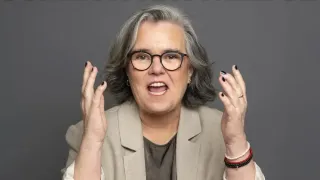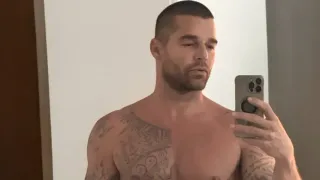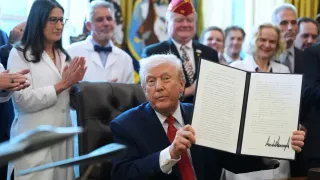February 10, 2023
Celebs Tout Ice Baths, but Science on Benefits is Lukewarm
Lindsey Tanner READ TIME: 4 MIN.
The coolest thing on social media these days may be celebrities and regular folks plunging into frigid water or taking ice baths.
The touted benefits include improved mood, more energy, weight loss and reduced inflammation, but the science supporting some of those claims is lukewarm.
Kim Kardashian posted her foray on Instagram. Harry Styles has tweeted about his dips. Kristen Bell says her plunges are "brutal" but mentally uplifting. And Lizzo claims ice plunges reduce inflammation and make her body feel better.
Here's what medical evidence, experts and fans say about the practice, which dates back centuries.
The Mind
You might call Dan O'Conor an amateur authority on cold water immersion. Since June 2020, the 55-year-old Chicago man has plunged into Lake Michigan almost daily, including on frigid winter mornings when he has to shovel through the ice.
"The endorphin rush ... is an incredible way to wake up and just kind of shock the body and get the engine going," O'Conor said on a recent morning when the air temperature was a frosty 23 degrees (minus-5 Celsius). Endorphins are "feel good" hormones released in response to pain, stress, exercise and other activities.
With the lake temperature 34 degrees (1 Celsius), the bare-chested O'Conor did a running jump from the snow-covered shore to launch a forward flip into the icy gray water.
His first plunge came early in the pandemic, when he went on a bourbon bender and his annoyed wife told him to "go jump in the lake." The water felt good that June day. The world was in a coronavirus funk, O'Conor says, and that made him want to continue. As the water grew colder with the seasons, the psychological effect was even greater, he said.
"My mental health is a lot stronger, a lot brighter. I found some Zen down here coming down and jumping into the lake and shocking that body," O'Conor said.
Dr. Will Cronenwett, chief of psychiatry at Northwestern University's Feinberg medical school, tried cold-water immersion once, years ago while visiting Scandinavian friends on a Baltic island. After a sauna, he jumped into the ice-cold water for a few minutes and had what he called an intense and invigorating experience.
"It felt like I was being stabbed with hundreds of millions of really small electrical needles," he said. "I felt like I was strong and powerful and could do anything."
But Cronenwett says studying cold water immersion with a gold-standard randomized controlled trial is challenging because devising a placebo for cold plunges could be difficult.
There are a few theories on how it affects the psyche.
Cronenwett says cold water immersion stimulates the part of the nervous system that controls the resting or relaxation state. That may enhance feelings of well-being.
It also stimulates the part of the nervous system that regulates fight-or-flight stress response. Doing it on a regular basis may dampen that response, which could in turn help people feel better able to handle other stresses in their lives, although that is not proven, he said.
"You have to conquer your own trepidation. You have to muster the courage to do it," he said. "And when you finally do it, you feel like you've accomplished something meaningful. You've achieved a goal."
Czech researchers found that cold water plunging can increase blood concentrations of dopamine – another so-called happy hormone made in the brain – by 250%. High amounts have been linked with paranoia and aggression, noted physiologist James Mercer, a professor emeritus at the Arctic University of Norway who co-authored a recent scientific review of cold water immersion studies.
The Heart
Cold water immersion raises blood pressure and increases stress on the heart. Studies have shown this is safe for healthy people and the effects are only temporary.
But it can be dangerous for people with heart trouble, sometimes leading to life-threatening irregular heartbeats, Cronenwett said. People with heart conditions or a family history of early heart disease should consult a physician before plunging, he said.
Metabolism
Repeated cold-water immersions during winter months have been shown to improve how the body responds to insulin, a hormone that controls blood sugar levels, Mercer noted. This might help reduce risks for diabetes or keep the disease under better control in people already affected, although more studies are needed to prove that.
Cold water immersion also activates brown fat – tissue that helps keep the body warm and helps it control blood sugar and insulin levels. It also helps the body burn calories, which has prompted research into whether cold water immersion is an effective way to lose weight. The evidence so far is inconclusive.
Immune System
Anecdotal research suggests that people who routinely swim in chilly water get fewer colds, and there's evidence that it can increase levels of certain white blood cells and other infection-fighting substances. Whether an occasional dunk in ice water can produce the same effect is unclear.
Among the biggest unanswered questions: How cold does water have to be to achieve any health benefits? And will a quick dunk have the same effect as a long swim?
"There is no answer to 'the colder the better,'" Mercer said. "Also, it depends on the type of response you are looking at. For example, some occur very quickly, like changes in blood pressure. ... Others, such as the formation of brown fat, take much longer."
O'Conor plunges year-round, but he says winter dunks are the best for "mental clarity," even if they sometimes last only 30 seconds.
On those icy mornings, he is "blocking everything else out and knowing that I got to get in the water, and then more importantly, get out of the water."






